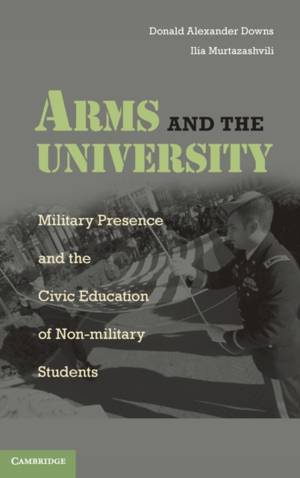
- Afhalen na 1 uur in een winkel met voorraad
- Gratis thuislevering in België vanaf € 30
- Ruim aanbod met 7 miljoen producten
- Afhalen na 1 uur in een winkel met voorraad
- Gratis thuislevering in België vanaf € 30
- Ruim aanbod met 7 miljoen producten
Zoeken
Arms and the University
Military Presence and the Civic Education of Non-Military Students
Donald Alexander Downs
Hardcover | Engels
€ 158,95
+ 317 punten
Uitvoering
Omschrijving
Alienation between the U.S. military and society has grown in recent decades. Such alienation is unhealthy, as it threatens both sufficient civilian control of the military and the long-standing ideal of the "citizen soldier." Nowhere is this issue more predominant than at many major universities, which began turning their backs on the military during the chaotic years of the Vietnam War. Arms and the University probes various dimensions of this alienation, as well recent efforts to restore a closer relationship between the military and the university. Through theoretical and empirical analysis, Donald Alexander Downs and Ilia Murtazashvili show how a military presence on campus in the form of ROTC (including a case study of ROTC's return to Columbia and Harvard universities), military history, and national security studies can enhance the civic and liberal education of non-military students, and in the process help to bridge the civil-military gap.
Specificaties
Betrokkenen
- Auteur(s):
- Uitgeverij:
Inhoud
- Aantal bladzijden:
- 456
- Taal:
- Engels
Eigenschappen
- Productcode (EAN):
- 9780521192323
- Verschijningsdatum:
- 27/02/2012
- Uitvoering:
- Hardcover
- Formaat:
- Genaaid
- Afmetingen:
- 157 mm x 236 mm
- Gewicht:
- 771 g

Alleen bij Standaard Boekhandel
+ 317 punten op je klantenkaart van Standaard Boekhandel
Beoordelingen
We publiceren alleen reviews die voldoen aan de voorwaarden voor reviews. Bekijk onze voorwaarden voor reviews.











